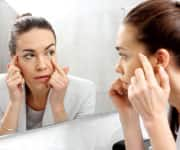Life Extension Magazine®
One of the most common complaints of older adults to their physician is a lack of energy, or a feeling of being "tired all the time." These are just a few of the symptoms of fatigue.
As many as one-third of adults suffer from fatigue symptoms that substantially interfere with their daily lives.1 In fact, it is so common in elderly people that many physicians either ignore it, or chalk it up to "normal aging."2
There have been growing concerns that if left untreated, fatigue can progress to a debilitating condition known as chronic fatigue syndrome.1,2 That means that a large group of otherwise healthy older adults are suffering from a progressive condition without adequate therapy.
But what if there was a way to start feeling like yourself again in as little as one week?
A new study shows that supplementation with an extract of the plant Rhodiola rosea produces statistically significant improvements in symptoms associated with fatigue—and it starts working in less than a week.1
Rhodiola represents a safe and effective way to combat the real-world fatigue that so many adults face as they grow older.
Rhodiola Combats Prolonged and Chronic Fatigue

An article published online in February 2017 in the journal Complementary Medicine Research reports on an important study of subjects with prolonged fatigue (fatigue lasting between one and six months), and those with chronic fatigue syndrome (fatigue lasting longer than six months).1
This is important because of growing concerns that fatigue worsens without effective treatment.1,2
Successfully treating patients with fatigue lasting less than 6 months would be a major breakthrough. It could prevent prolonged fatigue from progressing to debilitating chronic fatigue syndrome.1
The investigators studied extracts of Rhodiola rosea, which has adaptogenic properties. Adaptogens are natural compounds that help your body adapt to stress—a major contributor to fatigue.
Rhodiola has long been popular in Eastern European and Asian traditional medical systems for its nervous system stimulation, antidepressive, fatigue-eliminating, and performance-enhancing properties.3 Research shows that adaptogens improve mental performance and enhance endurance in people with fatigue.1,4
Let's look at the details of this 2017 study.1
What You Need to Know
 |
Fight Fatigue with Rhodiola
- Fatigue affects up to one-third of the US adult population, impacting quality of life, work productivity, and relaxation.
- Modern medical care has little to offer people with fatigue, and in fact may belittle their problems.
- Rhodiola rosea (golden root) has been revered as an adaptogen in traditional medical systems for centuries, targeting people with low energy, anxiety, depression, and stress.
- Studies now show that Rhodiola extracts act directly and indirectly on the body's stress-response systems at a biochemical level, enhancing our ability to overcome stress and improve energy levels.
- A new open-label clinical trial just out in 2017 has shown across-the-board improvements in symptoms in Rhodiola-supplemented subjects with prolonged or chronic fatigue, validating and extending findings from earlier randomized, placebo-controlled studies.
- It is now clear that Rhodiola's adaptogenic properties make it an ideal candidate for battling fatigue as well as the stresses that generate and sustain it.
- Anyone suffering unremitting fatigue for one month or more should explore the fatigue-resisting, stress-relieving powers of Rhodiola.
Reduce Fatigue Symptoms in Just One Week
The 2017 study included 100 subjects with either prolonged or chronic fatigue.1 All subjects took 400 mg (200 mg twice per day) of Rhodiola rosea extract every day for eight weeks. They were then administered standard tests and received scores relating to fatigue and functional impairment.
By the end of the study, there was a significant decrease in all measures of fatigue and impairment used.1
The subjects didn't have to wait long to see results. The fastest decline across all outcome measures occurred in the very first week of the study, and these measures continued to fall significantly between week four and the end of the study.1
Rapid improvement in levels of stress, sleep quality, anxiety/panic/phobia, depression, and executive function (the ability to sort priorities and execute intentions) were also seen. In addition, scores on the Clinical Global Impression scale showed that 83% of subjects reported themselves to be "very much" or "much" improved by the end of the study.1
The safety profile of this extract was also favorable.1
This was a large clinical trial with uniformly positive results, and included a substantial number of subjects with prolonged as well as chronic fatigue, making it groundbreaking in its own way.
This study did not include a placebo arm. Other studies were placebo-controlled and have shown encouraging results with Rhodiola extracts in the setting of fatigue and its major input, stress.
Stress-Reducing Adaptogen Combats Fatigue
Stress exacerbates fatigue, reduces sleep quality, induces depression, and generally robs us of energy.5-7 In fact, a study immediately after Hurricane Andrew in 1992 showed that physical symptoms of chronic fatigue were sharply increased by the brutal storm and its aftermath.8
Research shows the body's major stress-response system (called the hypothalamic-pituitary-adrenal axis, or HPA), is strongly implicated in chronic fatigue syndrome, which helps to explain why stress seems to worsen the condition.9
As one of the best known and most thoroughly documented adaptogens, Rhodiola has a lot to offer people who are suffering from fatigue that is either brought on by stress or exacerbated by it. Clinical trials have produced some exciting results for Rhodiola extracts in this context.
One such study evaluated a population of people with life-stress symptoms.10 In this study, 101 subjects received 400 mg (200 mg twice per day) of Rhodiola per day for four weeks.
As with the 2017 study of Rhodiola in fatigued patients, all of the stress scores evaluated improved during the study, showing reductions in stress symptoms, disability, and functional impairment.10 And patients started seeing improvements in just three days!
Remarkably, these improvements continued to grow for the entire four weeks of the study.
The True Test of Stress Reduction
There's hardly a more stressed, fatigued group than physicians doing night duty, when the biological clock is disrupted, meals are irregular, sleep is scarce, and stress is high.
In a study of the effects of Rhodiola on fatigue in 56 healthy young physicians, subjects received either a standardized Rhodiola extract or placebo, and then underwent five different tests of stress and fatigue at the beginning and end of a two-week period of night duty.11
The group receiving the Rhodiola extract experienced a significant improvement in all of these tests. This is a clear indication of Rhodiola's stress- and fatigue-fighting adaptogenic properties.
Several other randomized, placebo-controlled studies have confirmed or extended these findings in people undergoing stress and experiencing fatigue—including college students during exam periods, military cadets in basic training, and otherwise healthy adults with stress-related fatigue.12-14
These studies all used slightly different outcome measures, but reached startlingly similar results, showing that Rhodiola rosea extract significantly improved:
- Physical fitness, mental fatigue, and performance on neurological and motor tests
- Self-assessed general well-being
- Scores on a specially-designed anti-fatigue index
- Scores on a standardized "burnout" scale
- Mental health measures
- Cognitive tests of attention
- Cortisol responses to stress
Studies in laboratory animals corroborate these effects. For example, Rhodiola extract significantly induced antidepressant-like, antianxiety-like, and energy-stimulating effects in mice.15 In rats subjected to a forced-swim test, animals supplemented with Rhodiola extract for four weeks demonstrated significantly increased swimming performance and longer swimming times, a demonstration of increased energy and endurance.16,17
The evidence shows that the way Rhodiola achieved these effects was by inhibiting oxidative stress in blood, liver, and skeletal muscles, while increasing stress-responsiveness (this was measured by higher levels of the stress-resisting protein Hsp70).16,17
Rhodiola's Adaptogenic Properties Fight Fatigue-Inducing Stress
 |
Rhodiola rosea has a lengthy history in traditional medical systems in Eastern Europe and Asia, where it is considered an adaptogen.3,18
The term "adaptogen" has only recently gained credibility in our Western-dominated, cause-and-effect-oriented scientific communities, but the concept is now well-supported by key biochemical discoveries.4
A review in Current Clinical Pharmacology, a journal that publishes peer-reviewed articles on the latest advances in clinical pharmacology, defined adaptogens as, "A pharmacological group of herbal preparations that increase tolerance to mental exhaustion and enhance attention and mental endurance in situations of decreased performance."4
In other words, adaptogens help your body adapt to stress. Adaptogens essentially help regulate the HPA axis or the body's major stress response system.
Since stress is a major contributor to fatigue, helping your body better manage stress represents an important way to help combat fatigue.
Rhodiola rosea extracts have been found to improve key stress-related features of prolonged and chronic fatigue, including attention, cognitive function, and mental performance.4
Research now shows that adaptogens like Rhodiola protect against stress by modulating interactions between the hypothalamus, the pituitary, and the adrenal glands, where the stress hormone cortisol is produced.4
Biochemically, Rhodiola extracts up-regulate the "stress-sensor" protein called Hsp70, which is a core regulator of cell survival or death. When Hsp70 is activated, it inhibits the production of stress-induced nitric oxide, and modulates levels of circulating cortisol.
These changes in turn result in increased production of ATP, the energy-rich molecule that all cells use for power, which increases endurance and performance (mental as well as physical).4
It is these adaptogenic properties that give Rhodiola extracts their stress- and fatigue-specific effects.
Summary

Prolonged fatigue—the kind that interferes with daily work, home life, and pleasure—affects up to one-third of US adults. If not dealt with, it can progress to full-blown chronic fatigue syndrome.
There is no safe, acceptable pharmacological cure for prolonged fatigue, leaving sufferers to live with poor quality of life and often leading to significant anxiety and depression.
In traditional medical systems of Eastern Europe and Asia, such symptoms have long been treated with extracts of Rhodiola rosea, which is known as an adaptogen.
Modern science has shown that Rhodiola extracts enhance the body's systems for dealing with chronic stress, which is a major contributor to all forms of fatigue.
Clinical studies show that Rhodiola's adaptogenic properties significantly improve symptoms associated with fatigue. This includes improving scores on multiple scales of fatigue, cognitive performance, attention, and more, while reducing measurable stress levels.
In addition to the research described in this article, studies published by other clinicians have used a range of doses to evaluate the effects of Rhodiola on stress and cognitive fatigue.11-13,19
Those suffering from fatigue severe enough to interfere with quality of life, cognition, or attention may consider supplementing with 250 mg of standardized Rhodiola extract before breakfast and a second 250 mg capsule before lunchtime, both doses on an empty stomach.
If you have any questions on the scientific content of this article, please call a Life Extension® Wellness Specialist at 1-866-864-3027.
References
- Lekomtseva Y, Zhukova I, Wacker A. Rhodiola rosea in Subjects with Prolonged or Chronic Fatigue Symptoms: Results of an Open-Label Clinical Trial. Complement Med Res. 2017;24(1):46-52.
- Gambert S. Why do I always feel so tired? Evaluating older patients reporting fatigue. Consultant. 2013;53(11):785-9.
- Kelly GS. Rhodiola rosea: a possible plant adaptogen. Altern Med Rev. 2001;6(3):293-302.
- Panossian A, Wikman G. Evidence-based efficacy of adaptogens in fatigue, and molecular mechanisms related to their stress-protective activity. Curr Clin Pharmacol. 2009;4(3):198-219.
- Pae CU, Marks DM, Patkar AA, et al. Pharmacological treatment of chronic fatigue syndrome: focusing on the role of antidepressants. Expert Opin Pharmacother. 2009;10(10):1561-70.
- Van Houdenhove B, Luyten P. Customizing treatment of chronic fatigue syndrome and fibromyalgia: the role of perpetuating factors. Psychosomatics. 2008;49(6):470-7.
- Van Houdenhove B, Pae CU, Luyten P. Chronic fatigue syndrome: is there a role for non-antidepressant pharmacotherapy? Expert Opin Pharmacother. 2010;11(2):215-23.
- Lutgendorf SK, Antoni MH, Ironson G, et al. Physical symptoms of chronic fatigue syndrome are exacerbated by the stress of Hurricane Andrew. Psychosom Med. 1995;57(4):310-23.
- Tanriverdi F, Karaca Z, Unluhizarci K, et al. The hypothalamo-pituitary-adrenal axis in chronic fatigue syndrome and fibromyalgia syndrome. Stress. 2007;10(1):13-25.
- Edwards D, Heufelder A, Zimmermann A. Therapeutic effects and safety of Rhodiola rosea extract WS(R) 1375 in subjects with life-stress symptoms--results of an open-label study. Phytother Res. 2012;26(8):1220-5.
- Darbinyan V, Kteyan A, Panossian A, et al. Rhodiola rosea in stress induced fatigue--a double blind cross-over study of a standardized extract SHR-5 with a repeated low-dose regimen on the mental performance of healthy physicians during night duty. Phytomedicine. 2000;7(5):365-71.
- Spasov AA, Wikman GK, Mandrikov VB, et al. A double-blind, placebo-controlled pilot study of the stimulating and adaptogenic effect of Rhodiola rosea SHR-5 extract on the fatigue of students caused by stress during an examination period with a repeated low-dose regimen. Phytomedicine. 2000;7(2):85-9.
- Shevtsov VA, Zholus BI, Shervarly VI, et al. A randomized trial of two different doses of a SHR-5 Rhodiola rosea extract versus placebo and control of capacity for mental work. Phytomedicine. 2003;10(2-3):95-105.
- Olsson EM, von Scheele B, Panossian AG. A randomised, double-blind, placebo-controlled, parallel-group study of the standardised extract shr-5 of the roots of Rhodiola rosea in the treatment of subjects with stress-related fatigue. Planta Med. 2009;75(2):105-12.
- Perfumi M, Mattioli L. Adaptogenic and central nervous system effects of single doses of 3% rosavin and 1% salidroside Rhodiola rosea L. extract in mice. Phytother Res. 2007;21(1):37-43.
- Lee FT, Kuo TY, Liou SY, et al. Chronic Rhodiola rosea extract supplementation enforces exhaustive swimming tolerance. Am J Chin Med. 2009;37(3):557-72.
- Huang SC, Lee FT, Kuo TY, et al. Attenuation of long-term Rhodiola rosea supplementation on exhaustive swimming-evoked oxidative stress in the rat. Chin J Physiol. 2009;52(5):316-24.
- Panossian AG. Adaptogens in mental and behavioral disorders. Psychiatr Clin North Am. 2013;36(1):49-64.
- Spasov AA, Mandrikov VB, Mironova IA. The effect of the preparation rodakson on the psychophysiological and physical adaptation of students to an academic load. Eksp Klin Farmakol. 2000;63(1):76-8.

